
Airbrushing is a painting technique that provides an even finish and smooth look for painted surfaces. Traditionally, oil and acrylic are the paint formulations of choice for airbrushing, but latex paints can also be used with some slight modifications. Gear the paint formulation you use until .
Airbrushing With Latex
Video of the Day
Latex paints can be used for airbrushing if they are thinned to the right consistency. Usually latex paints are some of the thicker paints available on the market, which is why they are not usually used for airbrushing. Thinning the paint is a simple process, and can often be done with water. The airbrush may outline the thinning ratio for use with airbrushes, but it might not. If it doesn't, then you need to experiment with different amounts of thinners, working in small batches to determine the right amount of thinner. Up to 20 percent is usually a good ratio. Strain the paint before placing in the airbrush tank. Use a small mesh screen or even a cloth screen to strain the paint. Lumps can ruin the brush. Make sure to stir the paint thoroughly before using.
Video of the Day
Airbrush Techniques
The best way to apply latex paint with an airbrush is to work in small sections. Work about 3 to 6 inches away from the surface of the object you are painting. Apply light layers as you work, and cover the piece from several different angles. Allow one coat to dry before applying another, and apply two to three coats total. Always use a latex primer suitable for the material that you are painting. Clean nozzles and hoses with pipe cleaners. If the airbrush is gummed up, parts can be soaked in cleaning solution to loosen up dried paint.
Safety Tips
When airbrushing, safety is the largest concern. Always wear a respiratory mask and gloves to protect your hands. Breathing in the paint fumes is never a good idea. It is also a good idea to wear protective eye wear. Always be mindful of the air pressure and all hose connections because escaped air under pressure can be damaging to eyes and other objects around the work area. A large cardboard box can prevent overspray when working on small projects.